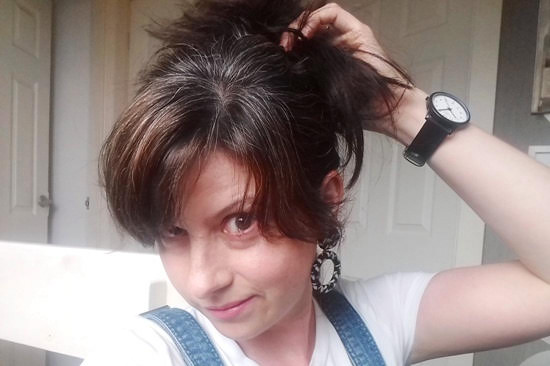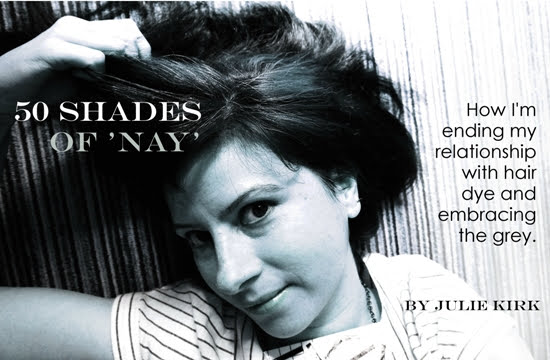Hello hello.
I know, I know. I'm never here. I treat this blog like a hotel. I never call.
Forgive me? I won't waste time making excuses, and hey, I'm here now, and while I am ... you can check out how much more of my grey is showing since the last time I was here. OK?
Before we begin, you should know …
I drafted out this post a few months ago, before I’d lived with the grey for any length of time. And, at this moment in time, I don't feel quite the same. Unlike my roots, my original feelings have been coloured by experience since then!
As of today (12.10.18) it's 25 weeks since I began my no-dye experiment, but my original thoughts, which you can read below - are from around the 6-12 week point. But I thought they were still worth sharing in case someone reading is only just now setting off on a greying adventure, and might be glad of the company. Welcome aboard!
I’ll try to get around to writing an update soon, and share my experiences from further down the grow-out line.
 |
| 14 weeks without dyeing. |
When I considered halting the Sisyphean cycle of covering-up my grey, the idea of looking older wasn’t actually my biggest concern. Still isn’t, but, hey, it’s big enough! And it’s probably the most obvious so … let’s deal with that one first, shall we?
All my life people have mistaken me for someone younger than my actual age.
When I first started working at the University, supporting students in and around campus, I was told that some other students on the course had asked: “Why is that girl always hanging around with X in his classes?”
I was 31.
Just this month a colleague asked if I’d ever had trouble turning down students’ requests for me to go for a coffee with them seeing as how “I was so much closer to them in age” than she was.
I’m 42. (And had no idea how to break it to her.)
And at least once in my 40s I’ve been IDed while buying wine.
Maybe it’s because I’m small (5ft 2in / size 10), or softly spoken, or child-free, or psychologically unwilling / unable to dress like a ‘proper lady'. But whatever it is, there’s something working to embellish me with a (thin!) veneer of youthfulness.
Or maybe it’s genetics. When my Dad retired from work people asked him why he was taking early retirement. He wasn’t. He was 65.
So - apart from using this as an opportunity to boast (joke!) - I wanted to explain how I’ve spent a lifetime correcting people’s assumptions about me, my age, my status, my experience. All of which has led me here, to wondering … how will having grey hair change all of that?
| 13 weeks without dyeing. |
Yeah. First world problems. Crack out the violins, right?
But while this all may sound privileged and indulgent I’m really just trying to be honest, so that anyone reading this who feels similarly, knows that at least one other person out there is feeling the same trepidation.
I won’t gloss over these concerns for fear of sounding superficial. That’s how women are systematically kept in place, through fear of sounding frivolous, childish, not serious (think how many things associated with traditional femininity - clothes, make-up, Rom-Coms - are also considered less worthy than masculine pastimes).
And it’s good to recognise the purely socially constructed embarrassment that persuades us to not dare to admit we’d still like to look young, all while being sold products that promote that exact idea! Then we’re tapped between either:
- being scared of looking old, and reaching for the hair dye ...
- or quietly going grey, while scared of looking old when we do!
Hence me talking about it here to contribute to the growing conversation between women experimenting with what grey means and looks like to them (check out the #grombre hashtag on Instagram for all kinds of gorgeous greying inspiration).
So, yes, looking older is absolutely a concern of mine. Going grey is possibly the most ageing change in my appearance since my front teeth grew back in when I was 7, or that time in the 90s when I thought boxy jackets were a worthy style choice.
| 13 weeks without dyeing. |
Fear No.2: The biggest fear. The fear of looking like I don’t care.
I dare you to admit it.
That there’s been a time when you noticed a woman with visible root regrowth (of any colour, not just grey) and you thought to yourself “Hmmm, has she seen herself in the mirror lately?”
I've thought it.
I’m not proud of it, but I have thought that kind of thing in the past. (I honestly try to not be judgemental about appearances at all any more).
But, because I’ve thought it, I know that - when a percentage of those (most likely) women who’ll witness to my current amazing technicolor dream hair - it will absolutely cross their mind that I’m ‘letting myself go’, that I must not care what I look like.
When I do.
I’m not proud of it, but I have thought that kind of thing in the past. (I honestly try to not be judgemental about appearances at all any more).
But, because I’ve thought it, I know that - when a percentage of those (most likely) women who’ll witness to my current amazing technicolor dream hair - it will absolutely cross their mind that I’m ‘letting myself go’, that I must not care what I look like.
When I do.
Oh how I really do.
Again, as with the fear of looking older, the fear of sounding vain about your appearance is similarly not something we’re encouraged to openly confess!
I know that hair, makeup, clothes and shoes are not everyone’s priority. But to a lot of us, how we physically present ourselves to the world, is equally a huge part of how we construct who we are, for ourselves.
And if there wasn’t some truth to the idea that many of us enjoy putting our best selves forwards, then we’d all only ever take just one quick selfie, rather than pausing to pose for several, many, dozens! And yet - once again - women (young women and girls in particular) are frequently vilified for caring too much about their appearance. But for some it’s a critical part of who we are.
I know there are those whose only interest in clothes begins and ends with the practicalities:
- to fit with social convention,
- to keep warm
- to keep from being arrested for indecent exposure in the cereal aisle of Asda.
My look is how I tell you who I am. Who I want to be. And not just you … it tells me the same things about me. It creates and reinforces the person I am, who I've always been, since I started picking out my outfits and attempting to dress myself at 18 months old.
So the idea that someone might clock my grey grow-out and interpret it as evidence that I no longer care about my appearance that’s … aw, hell, that’s a sharp dig in all of my soft places!
And I know that - for however long my hair’s in this untidy, muddled, inbetweeny, neither one thing nor the other stage - the risk of looking a little dishevelled will be the thing that bugs me far more than the idea of looking older.
And I know that - for however long my hair’s in this untidy, muddled, inbetweeny, neither one thing nor the other stage - the risk of looking a little dishevelled will be the thing that bugs me far more than the idea of looking older.
Older is not something I can help. But looking put together, like I care, is something I should have control over.
And control could look like marching into a shop and buying a dye and mastering this unruly and ragged head of mine. And yet ...
... that's not the experiment is it? The experiment is seeing what this mop looks like once there's no longer a trace of dye amongst it.
And all my control right now is channelled into not dyeing it!
And, fortunately, while looking like I've stopped caring is indeed my biggest fear, I think maybe there’s something, a few things even, that I can do about it. A quick wardrobe restyle, a haircut, something, anything to give the impression that I still care, will hopefully do the trick. (If you've seen my Instagram account - @withjuliekirk - at any point in the few months since I wrote this, you'll know I definitely gave the hair chopping thing a go.)
And, fortunately, while looking like I've stopped caring is indeed my biggest fear, I think maybe there’s something, a few things even, that I can do about it. A quick wardrobe restyle, a haircut, something, anything to give the impression that I still care, will hopefully do the trick. (If you've seen my Instagram account - @withjuliekirk - at any point in the few months since I wrote this, you'll know I definitely gave the hair chopping thing a go.)
So, there's that ray of hope. And while I’m growing out these silvering locks I’ll take all the silver linings I can get!
***
Do join in the conversation ...
- are you happy to share any of your own greying fears?
- is your biggest fear the fear of looking older ... or looking like you don't care? Or something else entirely?
- or maybe you've got tips on how to survive the months / years it takes to finally grow it all out?
- any advice on how to talk yourself out of ogling the packs of dye in Boots like how you eye-up the rotisserie chicken when you go to the supermarket before you've eaten lunch?
Whatever you've got to share, and wherever's easiest for you to share (here, Insta, Facebook, sky-writing) I'm all ears ... let's keep the grey chat going.
Julie




















